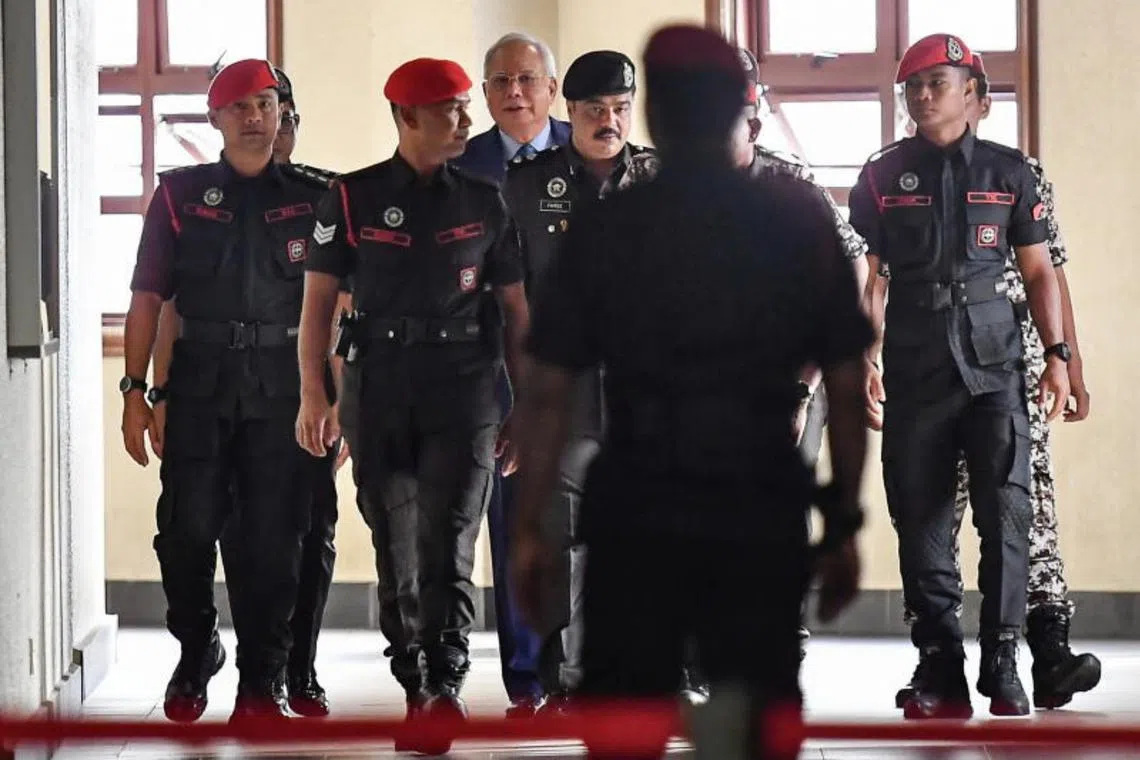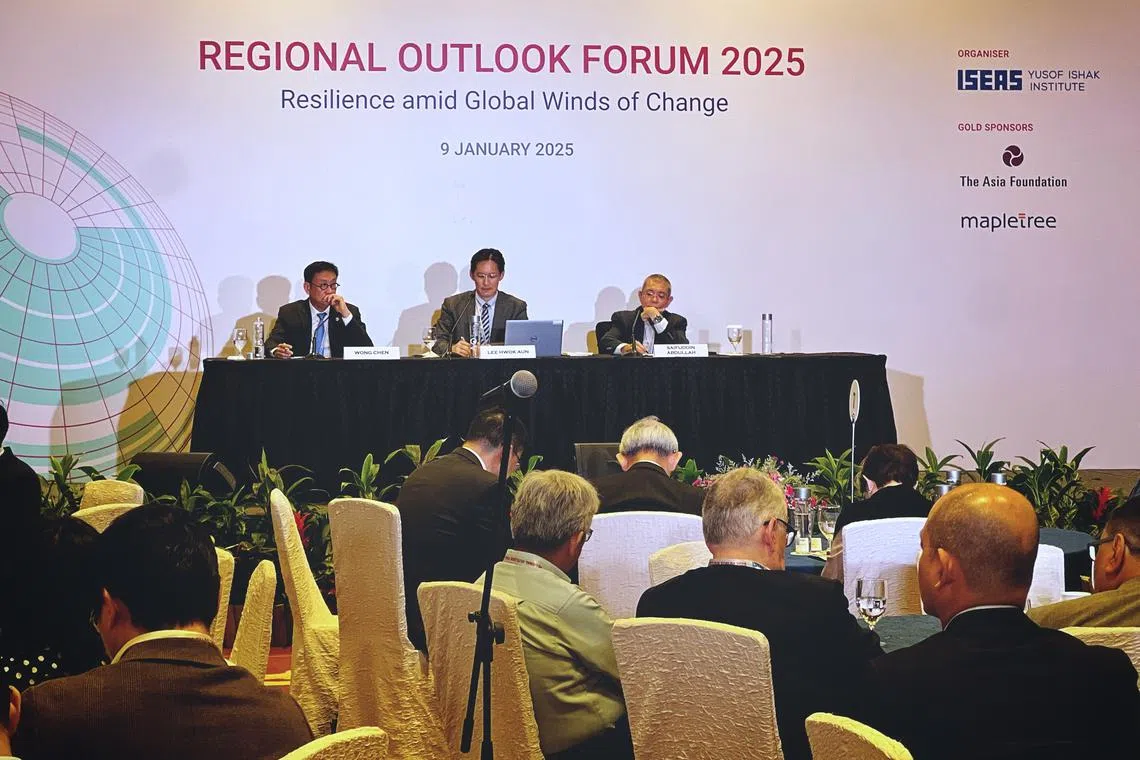Najib’s bid for house arrest rattles Malaysian govt, but is seen as unlikely to topple PM Anwar
Sign up now: Get insights on the biggest stories in Malaysia

Former Malaysian premier Najib Razak began serving a 12-year sentence in August 2022 for corruption linked to 1Malaysia Development Berhad.
PHOTO: BERNAMA
Follow topic:
SINGAPORE – A bid for house arrest by jailed former Malaysian premier Najib Razak has rattled the administration of Prime Minister Anwar Ibrahim, as his opponents and the Umno faction in his multi-coalition government are exploiting the controversy for their own gain.
The issue has thrown up questions of whether the government has been “hiding” a note from the former Malaysian king that decreed Najib should serve the remainder of his prison sentence at home, while the opposition is agitating for Datuk Seri Anwar to step down for mishandling the matter.
In a panel discussion organised by the ISEAS – Yusof Ishak Institute in Singapore on Jan 9, politicians from both sides of the political divide gave differing views on the controversy.
A lawmaker from Mr Anwar’s Pakatan Harapan (PH) coalition believes that the opposition has lost its “last chance” of toppling the administration by using the Najib house-arrest issue.
This last chance is the rally attended by thousands of people on Jan 6 outside the appeals court in Putrajaya where Najib’s case was being heard.
“I think Jan 6 was probably the last possible venue for the opposition to grab power, thank God it’s done,” Selangor PH lawmaker Wong Chen told the panel discussion titled “Malaysia – Madani at the Mid-Term: Closing Window for Reform?”, part of ISEAS’ annual Regional Outlook Forum in Singapore.
Mr Anwar dubs his administration the unity government, or the Madani government, promoting it as a responsive and inclusive administration.
“The question then is, can the unity government survive a full term? The answer is yes, if it (the economy) continues to grow,” Mr Wong said, adding that Malaysians are tired of the ongoing political “conflicts” over the past few years.
The country’s next general election (GE) must be held by February 2028.
However, the opposition, which is using the house-arrest issue to weaken the two-year-old Malaysian government, said it is only beginning to agitate on the matter.
Opposition MP Saifuddin Abdullah from Pahang, who was also a panellist, said the house-arrest issue was in fact “the beginning of the last chance” for the opposition to topple Mr Anwar’s government.
“We will of course need to wait for the next GE, but if there’s an opportunity and if the problems are so big... then you can’t blame us if there were to be some kind of move to take over the government before the term expires,” said Datuk Seri Saifuddin, who is from the opposition Perikatan Nasional (PN) coalition.
Najib began serving a 12-year sentence in August 2022 for corruption linked to 1Malaysia Development Berhad, but controversy erupted in January 2024 when his sentence and fine were reduced by the Pardons Board, chaired by Malaysia’s then King, Sultan Abdullah Ahmad Shah.
Najib has since been campaigning to serve the remainder of his jail term at home.
A bigger uproar ensued in December 2024 when Najib’s lawyers filed a fresh bid for house arrest,

(From left) Selangor PH lawmaker Wong Chen, Dr Lee Hwok-Aun and Perikatan Nasional MP Saifuddin Abdullah from Pahang during a panel discussion organised by ISEAS-Yusof Ishak Institute.
ST PHOTO: HARITH MUSTAFFA
On Jan 6, Najib’s lawyers presented a letter to the Court of Appeal confirming the purported addendum, signed by the comptroller of the Pahang palace, which led politicians and political activists to question why the government was “hiding” it from the public for nearly a year.
The Prime Minister and his Cabinet ministers have responded by saying there was no such supplemental letter discussed in the January 2024 Pardons Board meeting, and this was subsequently confirmed by the Federal Territories Pardons Board.
Still, the damage has been done, with analysts saying the rally was an attempt by the opposition to drive a wedge between PH and its coalition ally, Umno-led Barisan Nasional, which Najib helmed before stepping down in 2018.
Experts say that while Umno is unhappy with how Mr Anwar has been wishy-washy in backing Najib, it will stick with the PH ruling coalition to continue pushing for Najib’s case and to remain in government, although this would weaken the Prime Minister.
In addition, both panellists on Jan 9 – in the discussion moderated by ISEAS senior fellow, Dr Lee Hwok-Aun – agreed that there is mounting pressure on Mr Anwar because his promises for reform, including battling corruption, mitigating the rising cost of living and improving governance, have yet to be realised.
“Najib is dragging Madani (government) down the water... daring Anwar with mutual destruction by splitting Umno,” Sunway University political scientist Wong Chin Huat told The Straits Times.
“However, Najib’s ultimate weakness is that there is no public support for him among the Malays. (This is) contrary to his loyalists’ claim that Najib can help to revive Umno, as middle-ground Malays reject Umno because of corruption.”
Harith Mustaffa is a journalist covering Malaysia for The Straits Times, with a focus on Johor.

